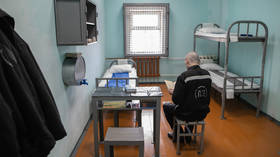Chair of Russian court discusses return of death penalty

The moratorium on capital punishment imposed in Russia in 1997 after the country joined the Council of Europe could be lifted in the future, the chairman of the country’s Constitutional Court said on Tuesday.
In a book published on the website of the court, Valery Zorkin suggested that the country return to the doctrine of national identity and that constitutional control means Moscow should make its own laws, rather than take influence from other countries in Europe. In Zorkin’s view, the introduction of a moratorium on capital punishment was a concession to values which are not inherent in Russia.
“The fact that the Constitutional Court has made a decision making it impossible to use the death penalty in Russia at this historical stage of its development does not rule out the possibility of a return to this form of punishment in the future,” Zorkin said.
Russia has an indefinite moratorium on the application of capital punishment, which was a prerequisite for joining the Council of Europe. However, the death penalty has not been formally abolished. A constitutional court ruling could change that.
According to Zorkin, the death penalty cannot be completely ruled out, as there will always be the existence of premeditated murders.
In the USSR and Russia, he death penalty was imposed for various crimes until the mid-1990s. The moratorium on the death penalty appeared in 1997, when Moscow signed the Convention for the Protection of Human Rights and Fundamental Freedoms concerning the Abolition of the Death Penalty.
In practice, the death penalty had already not been applied for a year, despite it still existing in the criminal code.
The move to reinstate capital punishment has been backed by some lawmakers, including MP Mikhail Sheremet from the ruling United Russia party.
“We are too late with this question. Lifting the moratorium on the death penalty is a necessary and justified measure. This decision should have been made long ago,” he told news agency RIA Novosti. “The death penalty would be a kind of inoculation against paedophiles and maniacs, who cause great damage to the security and morality of our society.”
“We do not need to follow Western stereotypes and imposed dogmas of behavior. I think it is appropriate to put the issue of the return of the death penalty to public discussion,” he said.













